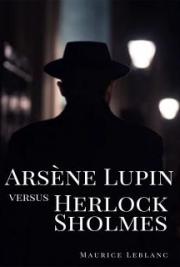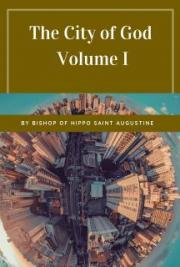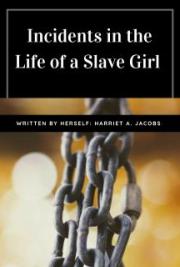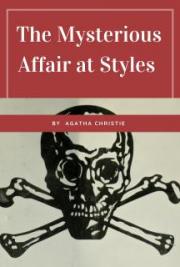25. The Scientific Gunman
Our little audience arrived one by one, and, as master of ceremonies, it fell to me to greet them and place them as much at ease as the natural tension of the occasion would permit. Garrick spoke a word or two to each, but was still busy putting the finishing touches on the preparations for the "entertainment," as he called it facetiously, which he had arranged.
"Before I put to the test a rather novel combination which I have arranged," began Garrick, when they had all been seated, "I want to say a few words about some of the discoveries I have already made in this remarkable case."
He paused a moment to make sure that he had our attention, but it was unnecessary. We were all hanging eagerly on his words.
"There is, I believe," he resumed slowly, "no crime that is ever without a clew. The slightest trace, even a drop of blood no larger than a pin-head, may suffice to convict a murderer. So may a single hair found on the clothing of a suspect. In this case," he added quickly, "it is the impression made by the hammer of a pistol on the shell of a cartridge which leads unescapably to one conclusion."
The idea was so startling that we followed Garrick's every word as if weighted with tremendous importance, as indeed it was in the clearing up of this mysterious affair.
"I have made a collection from time to time," he pursued, "of the various exploded cartridges, the bullets, and the weapons left behind by the perpetrator of the dastardly series of crimes, from the shooting of the stool pigeon of the police, Rena Taylor, and the stealing of Mr. Warrington's car, down to the peculiar events of last night up in the Ramapos and the running fight through the streets of New York in taxicabs this morning.
"I have studied this evidence with the microscope and the microphotographic apparatus. I have secured excellent microphotographs of the marks made by various weapons on the cartridges and bullets. Taking those used in the commission of the greater crimes in this series, I find that the marks are the same, apparently, whether the gun shot off a bullet of wax or tallow which became liquid in the body, whether it discharged a stupefying gas, or whether the deadly anaesthetic bullet was fired. I have obtained a gun"--he threw it on the table with a clang--"the marks from the hammer of which correspond with the marks made on all the cartridges I have mentioned. One person owned that gun and used it. That is proved. It remains only to connect that gun positively and definitely, as a last link, with that person."
I noticed with a start that the revolver still had a stout cord tied to it.
As he concluded, Garrick had begun fitting a curious little device to each of our forearms. It looked to me like an electrode consisting of large plates of German silver, covered with felt and saturated with salt solution. From each electrode wires ran across the floor to some hidden apparatus.
"Back of this screen," he went on, indicating it in the corner of the room, "I have placed what is known as the string galvanometer, invented, or, perhaps better, perfected by Dr. Einthoven, of Leyden. It was designed primarily for the study of the beating of the heart in cases of disease, but it also may be used to record and study emotions as well,--love and hate, fear, joy, anger, remorse, all are revealed by this uncanny, cold, ruthlessly scientific instrument.
"The machine is connected by wires to each of you, and will make what are called electrocardiographs, in which every emotion, every sentiment, every passion is recorded inevitably, inexorably. For, the electric current that passes from each of you to the machine over these wires carrying the record of the secrets of your hearts is one of the feeblest currents known to science. Yet it can be caught and measured. The dynamo which generates this current is not a huge affair of steel castings and endless windings of copper wire. It is merely the heart of the sitter.
"The heart makes only one three-thousandth of a volt of electricity at each beat. It would take thousands of hearts to light one electric light, hundreds of thousands to run one trolley car. Yet just that slight little current from the heart is enough to sway a gossamer strand of quartz fibre in what I may call my 'heart station' here. This current, as I have told you, passes from each of you over a wire and vibrates a fine quartz fibre in unison with it, one of the most delicate bits of mechanism ever made, recording the result on a photographic film by means of a beam of light reflected from a delicate mirror."
We sat spellbound as Garrick unfolded the dreadful, awe-inspiring possibilities of the machine behind the screen. He walked slowly to the back of the room.
"Now, here I have one of the latest of the inventions of the Wizard of West Orange--Edison," he resumed. "It is, as you perhaps have already guessed, the latest product of this genius of sound and sight, the kinetophone, the machine that combines moving pictures with the talking machine."
A stranger stepped in from an outer office. He was the skilled operator of the kinetophone, whom Garrick had hired. In a few terse sentences he explained that back of a curtain which he pulled down before us was a phonograph with a megaphone, that from his booth behind us he operated the picture films, and that the two were absolutely synchronized.
A moment later a picture began to move on the screen. Sounds and voices seemed to emerge as if from the very screen itself. There, before us, we saw a gambling joint operating in full blast. It was not the Forty-eighth Street resort. But it was strongly reminiscent of it. From the talking machine proceeded all the noises familiar to such a scene.
Garrick had moved behind the screen that cut off our view of the galvanometer. One after another, he was studying the emotions of each of his audience.
Suddenly the scene changed. A door was burst in, cards and gambling paraphernalia were scattered about and hidden, men rushed to escape, and the sounds were much like those on the night of the raid. Garrick was still engrossed in the study of what the galvanometer was showing.
The film stopped. Without warning, the operator started another. It was a group of men and women playing cards. A man entered, and engaged in conversation with one of the women who was playing. They left the room.
The next scene was in an entirely different room. But the connection which was implied with the last scene was obvious. Different actors entered the room, a man and a woman. There was a dispute--there was a crack of a revolver--and the woman fell. People rushed in. Everything was done to hide the crime. The girl was carried out into a waiting automobile, propped in as if overcome by alcohol and whisked away. I found myself almost looking to see if the car was of the make of Warrington's, so great was the impression the scene made on me. Of course it was not, but it all seemed so real that one might be pardoned for expecting the impossible, especially when her body was thrown, with many a muttered imprecation, by the roadside, and in the last picture the man was cleaning the exploded gun. One single still picture followed. It was a huge, enlarged cartridge.
I followed the thing with eager eyes and ears. From a long list of canned and reeled plays, Garrick had selected here and there such scenes and acts as, interspersed with a few single, original pictures of his own, like the cartridge, would serve best to recapitulate the very case which we had been investigating. It carried me along step by step, wonderfully.
Another moving and talking picture was under way. This time it seemed to be a race between two automobiles. They were tearing along, and the sound of the rapidly working cylinders was most real. The rearmost was rapidly overhauling that in front. Imagine our surprise as it crept up on the other to see the driver rise, whip out a pistol, and fire point blank at the other as he dashed ahead, and the picture stopped.
A suppressed scream escaped Violet Winslow. It was too much like what had happened to Mortimer Warrington for her to repress the shudder that swept over her, and an involuntary movement toward him to make sure that it was not real.
Still Garrick did not move from his post at the galvanometer. He was taking no chances. He had us thrilled, tense, and he meant to take advantage to the full in reading the truth in the dramatic situation he had so skilfully created.
Another picture started almost on the heels of the last. It was of the robbery of a safe. Then came another, a firebug at work in starting a conflagration. We could hear the crackling of flames, the shouts of the people, the clang of bells, and the hasty tread of the firemen as they advanced and put out the blaze. The film play was one of those which never fail to attract, where the makers had gone to the utmost extent of realism and had actually set fire to a house to get the true effect.
The next was a scene from a detective play, pure and simple, in which that marvellous little instrument which had served us in such good stead in this case was played up strongly, the detectaphone. Then followed a scene from another play in which a young girl was kidnapped and rescued by her lover just in the nick of time. Nothing could have been selected to arouse the feelings of the little audience to a higher pitch.
The last of the series, which I knew was to be a climax, was not an American picture. It was quite evidently made in Paris and was from actual life. I myself had been startled when the title was announced by the voice and on the screen simultaneously, "The Siege of the Motor Bandits by the Paris Police." It was terrific. It began with the shouts of the crowd urging on the police, the crack of revolvers and guns from a little house or garage in the suburbs, the advance and retreat of the gendarmes on the stronghold. Back and forth the battle waged. One could hear the sharp orders of the police, the shrill taunts of the bandits, the sounds of battle.
Then at a point where the bandits seemed to have beaten off the attack successfully, there came an automobile. From it I could see the police take an object which I now knew must be a Mathiot gun. The huge thing was set up and carefully aimed. Then with a dull roar it was fired.
We could see the bomb hurtling through the air, see it strike the little house with a cloud of smoke and dust, hear the report of the explosion, the shouts of dismay of the bandits--then silence. A cry went up from the crowd as the police now pressed forward in a mass and rushed into the house, disclosing the last scene-in which the bandits were suffocated.
The film suddenly stopped. Garrick's office, which had been ringing with firearms and shouts from the kinetophone, was again silent. It was an impressive silence, too. No one of us but had felt and lived the whole case over again in the brief time that the talking movies had been shown.
The lights flashed up, and before we realised that the thing was over, Garrick was standing before us, holding in his hand a long sheet of paper. The look on his face told plainly that his novel experiment had succeeded.
"I may say," he began, still studying the paper in his hand, although I knew he must have arrived at his conclusion already or he would never have quitted his "heart station," so soon, "I may say that some time ago a letter was sent to Miss Winslow purporting to reveal some of Mr. Warrington's alleged connections and escapades. It is needless to say that as far as the accusations were concerned he was able to meet them all adequately and, as for the innuendoes, they were pure baseless fabrications. The sender was urged on to do it by someone else who also had an interest of another kind in placing Mr. Warrington in a bad light with Miss Winslow. But the sender soon realised his mistake. The fact that he was willing to go to the length of a dangerous robbery accompanied by arson in order to get back or destroy the letter showed how afraid he was to have a sample of his handwriting fall into my hands. He blundered, but even then he did not realise how badly.
"For, in certain cases the handwriting shows a great deal more than would be recognised even by the ordinary handwriting expert. This letter showed that the writer was, as I have already explained to Mr. Marshall, the victim of a peculiar kind of paralysis which begins to show itself in nerve tremours for days before the attack and exhibits itself even in the handwriting.
"Now, my string galvanometer shows not only the effects of these moving and talking pictures on the emotions, but also, as it was really designed to do, the state of the heart with reference to normality. It shows to me plainly the effect of disease on the heart, even if it is latent in the subject. While I have been using the psychological law of suggestion, and have been recapitulating as well as I was able under the circumstances the whole story of the crime briefly in moving and talking pictures, I have found, in addition, that the same heart which shows the emotions I expected also shows the disease which I discovered in the blackmailing letter.
"There was surprise at the sight of the gambling den, rage at the raid, fear at the murder of the girl in the other den and the disposal of her body, excitement over the racing motor cars, passion over the kidnapping of the girl, anger over the little detectaphone, and panic at the siege of the bandits, as I showed by the selection of the films that I was getting closer and closer to the truth. And there was the same abnormality of the heart exhibited throughout."
Garrick paused. I scarcely breathed, nor did I move my eyes, which were riveted on his face. What was he going to reveal next? Was he going to accuse someone in the room?
"Mr. Marshall," he resumed with a smile toward me, "I am glad to say is quite normal and innocent of all wrongdoing--in this instance," he added with a momentary flash of humour. "Commissioner Dillon also passes muster. Mr. Warrington--I shall come back to, later."
I thought Violet Winslow gave a little, startled gasp. She turned toward him, anyhow, and I saw that not even science now could shake her faith in him.
"Mr. Forbes," he continued, speaking rapidly as I bent forward to catch every word, "incriminated himself quite sufficiently in connection with the gambling joint, the raid and the slanderous letter, so that I should advise him when this case comes to trial to tell the whole truth and nothing but the truth about his helping a gunman in order to further what proved a hopeless love affair on his own part. Here, too, is a little vest-pocket gun that was found under such circumstances as would be likely to connect Forbes in the popular mind with the shootings."
"My lawyer has my statement about that. I'll read--"
"No, Forbes," interrupted Garrick. "You needn't read. Your lawyer may be interested to add this to the statement, however. A pistol that has been shot off has potassium sulphide from the powder in the barrel. Later, it oxidizes and iron oxide is found. This weapon has neither the sulphide nor the oxide, as far as I can determine. It has never even been discharged. No, it was not the pistol found on Forbes that figured in this case.
"As far as that new-fangled gun goes, Forbes, it was a frame-up. You were kidnapped by a man whom you thought was your friend, and it was done for a purpose. He knew the situation you were in, your jealousy--I won't dwell on that here. He held you at the house up in the valley. You told the truth about that. He did it, the man who wrote the letter, because he hoped ultimately to shift all the guilt on you and himself go scot-free."
Forbes stared dumbly. I knew he had known what was coming but had held back for fear of what he knew had always happened to informers in the circle to which he had sunk.
"McBirney," continued Garrick, "your emotions, mostly astonishment, show that you have much to learn in this new business of modern detection, besides the recovery of stolen cars."
Garrick had paused for effect again.
"And now we come to the keeper of a nighthawk garage on the West Side, a man whom they seem to call the Boss. That is getting higher up. I find that he points, according to this scientific third degree, to one whom I have for a long time suspected--"
A dull thud startled us.
I turned. A man was lying, face down, on the floor.
Before any of us could reach him, Garrick concluded, "This is the man who framed up the case against Forbes, who stole Warrington's car to use to get rid of the body of the informer, Rena Taylor, because she by her success interfered with his gambling graft, who wrote the letter to Miss Winslow to injure Warrington because he, too, was interfering with his graft collection from the gambling house by threatening to close it up. He committed the arson to cover up his identity by getting back the letter; he planned and nearly executed the kidnapping of Miss Winslow in order to hold up Warrington, and then hid in the country where we ferreted him out, not far from the very scene of a murderous attack on Warrington for his brave stand in suppressing gambling--from which this man was weekly shaking down a huge profit as the price of police protection of the vice." Garrick was kneeling by the prostrate form now, not so much the accuser as the scientist, studying a new phase of crime.
The threatened paralysis had struck Inspector Herman sooner than even Garrick had expected.
When we had made Herman as comfortable as we could, Garrick added to Dillon, who stood over us, speechless, "You had under you one of the strong links in the secret system of police protection of vice and crime, and you never knew it--the greatest grafter and scientific gunman that I ever knew. It has been a long, hard fight. But I have the goods on him at last."
The exposure was startling in the extreme. Herman had gained for himself the reputation of being one of the shrewdest and most efficient men in the department. But he had felt the lure of graft. With the aid of the gamblers and unscrupulous politicians he had built up a huge, secret machine for collection of the profits from the sale of police protection against the enforcement of the law he was sworn to uphold.
He had begun to mix with doubtful characters. But he was a genius and had become, by degrees, the worst of the gangmen and gunmen who ever operated in the metropolis. Detailed to catch the gamblers and gangsters, with official power to do almost as he pleased, he had enjoyed a fine holiday and employed his leisure both for new crimes and in covering up so successfully his tracks in the old ones, even with Garrick on his trail, that he had been able to completely hoodwink his superior, Dillon, by his long, detailed reports which sounded very convincing but which really meant nothing.
As the strange truth of the case was established by Garrick, Dillon was the most amazed of us all. He had trusted Herman, and the revulsion of feeling was overwhelming.
"And to think," he exclaimed, in disgust, "that I actually placed his own case in his own hands, with carte blanche instructions to go ahead. No wonder he never produced a clew that amounted to anything. Well, I'll be--"
Words failed him, as he looked down and glared savagely at the man in silence.
All were now crowding around Garrick eager to thank him for what he had done. As Warrington, now almost his former hearty wholesome self again, grasped Garrick's hand in the heartiness of his thanks, Garrick, with the electrocardiogram paper still in his other hand, smiled.
He released himself and turned to touch the dainty little hand of Violet Winslow, whose eyes were so full of happy tears that she could scarcely speak.
"Miss Winslow," he beamed, gazing earnestly and admiringly into her sweet face, "I promised to attend to the case of that man later,--" he added, with a nod at Warrington. "It may interest you to know scientifically what you already know by something that is greater than science, a woman's intuition."
She blushed as he added, "Mr. Warrington has a good, strong, healthy heart. He wouldn't be alive to-day if he hadn't. But, more than that, I have observed throughout the evening that he has hardly taken his eyes off you. Even the 'talkies' and the 'movies' failed to stir him until the kidnapping scene overwhelmed him. Here on this strip of paper I have a billet-doux. His heart registers the current that only that consummate electrician, little Dan Cupid, can explain."







